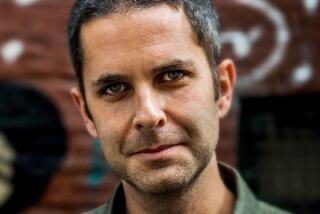Review: ‘The Imposter’ shows how deceiver bent a family’s reality
- Share via
A whole lot stranger than fiction, “The Imposter”is a documentary that’s disturbing in ways only reality can manage. This is a train wreck you think you see coming, but no matter how prepared you are the nature and extent of the damage will overwhelm you.
As directed by British documentarian Bart Layton, “The Imposter” tells the story of a dark-skinned French Algerian man, a world-class deceiver and manipulator, who managed to convince members of a distraught Texas family that he was their long-lost blond and blue-eyed teenage brother and son.
What makes this film so spooky and unnerving is that it shows how much of what we consider to be reality is merely a function of what we want to believe. Next to the power and desires of the human heart and mind, few things stand a chance, certainly not the puny construct we like to call the real world.
The disappeared boy is sassy 13-year-old Nicholas Barclay, who vanished from the streets of San Antonio in 1994. “It gives you nightmares, it really does,” says his still-distressed mother Beverly Dollarhide. “It didn’t make the news. It was just news to us.”
Then, three years and four months later, the family gets an out-of-nowhere phone call from Linares, Spain. Nicholas has been found and he wants to come home. Beyond shocked, Nicholas’ sister Carey Gibson remembers thinking that Linares must be a town in Texas. “You had like 100,000 questions you wanted answered immediately,” she says. “You want it to all happen now.”
The person in Spain, we find out at once, couldn’t be further from the 16-year-old Nicholas. Instead he is 23-year-old Frederic Bourdin, eventually known to European authorities as “La Chameleon” for his shape-shifting abilities. “As long as I remember,” he says, looking directly at the camera, bold as brass, “I wanted to be someone else. Someone who was acceptable.”
Terribly proud, as well he might be, of his gift for deception, Bourdin reveals in great detail the complicated chain of events that led him to feel the need for this particular deception and how it was that he came to pick Nicholas as the person whose identity he was going to steal.
Perhaps the most bizarre aspect of this situation is that Bourdin committed to being Nicholas without knowing what he looked like. Once the Frenchman found out that the Texas teen “looked nothing like me,” Bourdin experienced some moments of panic before concluding “something in my head decided I could do it.”
Critical to the deception was Bourdin’s almost terrifying gift for being the person who other people want to see along with his impeccable instincts for knowing the most effective way to respond to every situation. Plus, no one in Texas was prepared for the appearance of such a shrewd and ruthless sociopath. And no one ever dreamed it was worth anyone’s while to impersonate young Nicholas.
On their side, the San Antonio family had a powerful desire to see their kin again, a need to believe that was every bit as strong as Bourdin’s need to deceive. Even today, the interviews in “The Imposter” reveal how bewildered and blindsided the boy’s relatives were by the deception.
Bourdin didn’t just deceive the family. For periods of time he fooled everyone, including a sympathetic FBI agent. Eventually, however, the fraud started to unravel, but not before this already strange situation took one final unexpected turn.
Though the compelling interviews Layton elicited from both Bourdin and the Texas family are obviously the heart of “The Imposter,” the director has bolstered their effectiveness with the artful way he’s put this film together. Insinuating music joins with delicately done, atmospheric re-creations to help us envision this twisty reality as it unfolded.
“I don’t give a damn what other people were thinking,” Bourdin says at one point. “I care only about myself.” It’s as true a statement as anyone is likely to get out of this supremely devious individual.
----------------------------------
‘The Imposter’
MPAA rating: R for language
Running time: 1 hour, 35 minutes
Playing: The Nuart Theatre, West Los Angeles
More to Read
Only good movies
Get the Indie Focus newsletter, Mark Olsen's weekly guide to the world of cinema.
You may occasionally receive promotional content from the Los Angeles Times.










